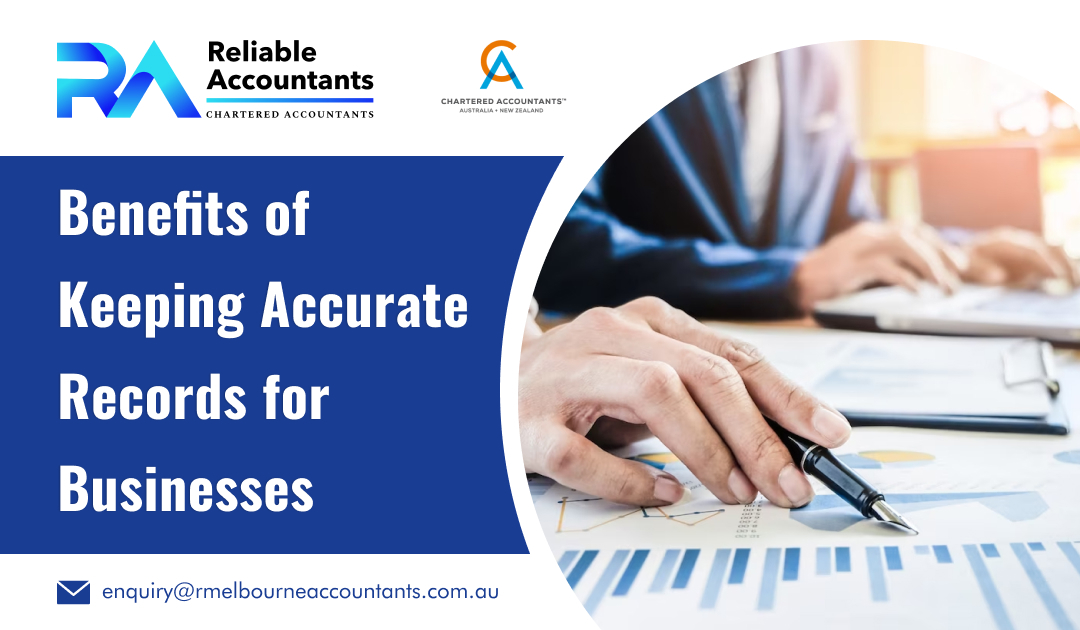How you record all your business records will have a direct impact on your business because organised records will help you stay organised, on the other hand, unorganised records will leave you in the mess, especially when your business decisions depend on your business finances. In this blog, we’ll explain the advantages of recording accurate business records.
Benefits of Keeping Business Records Accurate and Organised
Basically, record keeping process involves a record of each transaction and event in an accounting system. Since the principles of accounting depend on up-to-date and accurate records, and well-organised record-keeping is the foundation of accounting, it must be accurate.
Provide valuable insight into a business’s financial situation
Accurate business records offer you valuable insight into your business’s financial situation. For instance, by having organised business records, you can track spending patterns and identify areas in the business where extra costs can be reduced.
Promote better decision making
As a business owner, you need to understand your business finances to make a plan for your company. You may have to make decisions for your business. For this, you need to understand the financial condition of your company, and accurate bookkeeping can help you with this.
Manage your cash flow
When you need to manage business finances for the growth of your company, cash plays an important role. Maintaining cash flow can sustain against unforeseen circumstances to help you survive in the long run. This is where business record-keeping comes to play its role. It helps you know where your cash is coming in and out from.
Avoid tax penalties
If you fail to report taxes, income, and other documents, then it can result in tax penalties. If you don’t want to waste your hard-earned money on paying penalties, then it is important to keep your business records updated. By working with a professional tax return accountant, you can be sure that your all required documents are submitted to the government.
Avoid stress during tax time
At the end of the tax year, every taxpayer needs to pay a tax return. Australian tax deadlines are very strict, and the lodgment process can be time-consuming. However, if you have everything related to finances ready in place, you won’t scramble for invoices and receipts.
Types of Records You are Required to Keep
You need to maintain records that support the declaration and claims you make as the Australian tax system depends on the taxpayer’s self-assessment.
Records for payments you receive
For income you receive from wages, salary, government payments, allowances, or pensions and annuities your records may contain:
- If your employer reports to the ATO via single-touch payroll, then your record will include an income statement.
- Your payment summary of PAYG – individual non-business.
- A signed letter from the payer that gives the same information as an income statement.
- Your Pay As You Go payment summary – superannuation income stream.
For income you receive from managed funds or interest, your records may include:
- Passbooks, statements, or other important documents from your financial institution that demonstrate the amount of interest you receive.
- Advice or statements from managed funds that show
- your distribution amount
- any capital gains or losses
- any foreign income
- any primary production or non-primary production income amount
- your share of any credits
Records for Expenses
Most commonly, you need a receipt of your expenses. As an employee, to claim a deduction for work-related expenses:
- you must have invested the money and you were not reimbursed
- the expenses need to directly relate to earning your income
- you need to have a record as evidence to prove it
You have to show how the expenses are related to earning your income. Moreover, you need to:
- keep car expense records
- keep travel expense records
- keep transport expense records
- keep clothing, dry-cleaning and laundry expense records
- keep working from home expenses records for the method you usually use
- keep the phone, data and internet expense records
- maintain records for tools, equipment and other assets
If the expenses are related to your work, only then you can claim deductions otherwise, you are not allowed to claim expenses for personal purposes.
Records for Assets
If you obtain a capital asset, you make a capital loss or capital gain if you sell the asset near the future. Maintain records when you buy an asset to avoid paying taxes more than necessary.
Record for Local Government Councillors
You may also serve as an employee in addition to being a local government councillor. Your local governing body enforces the pay-as-you-go withholding system on its members. In such a scenario, it’s crucial to maintain written records of the work-related and car expenses you accumulate while performing your responsibilities as a councillor.
Conclusion
You can get plenty of benefits by having accurate and complete business records. Apart from this, you need to keep records as mentioned above. Moreover, you can seek help from Reliable Melbourne Accountants to manage your records.
Subscribe our YouTube channel for more updates:

